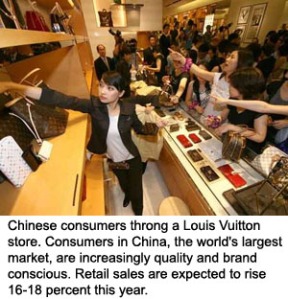 Foreigners are not the only ones concerned about the quality of the ‘Made in China’ label. Chinese consumers too are growing increasingly cautious of what they buy, often preferring to buy food and children’s toys in international supermarkets and under western brands that have sprung up throughout first and second tier cities across China.
Foreigners are not the only ones concerned about the quality of the ‘Made in China’ label. Chinese consumers too are growing increasingly cautious of what they buy, often preferring to buy food and children’s toys in international supermarkets and under western brands that have sprung up throughout first and second tier cities across China.
Quality control is a serious problem that has gripped Chinese consumers. They too are concerned about watermelons filled with dirty water to make them heavier, lead in children’s toys, clothing doused in toxic dye and melamine in milk.
Furthermore, as more Chinese go online to purchase products, it is also important to connect with consumers across segments and understand what they are looking for.
So how does an international firm sell to the largest market, with an ever increasing disposable income, that’s becoming extremely brand and health conscious?
Following are 2010’s top 3 mantra’s for selling to Chinese Consumers:
1. Chinese consumers are willing to pay a premium of up to 20% while purchasing health related goods, such as food, paint and toys, if they feel it gives them more value.
Trust in foreign brands is at an all time high, as Chinese consumers presume that foreign brands are less likely to cut corners in the production process. As a result, Chinese consumers are willing to pay more for foreign brands in which they see safer products and as a result higher value. Modern retail, driven by the demand for safer and better quality products is expected to see a boom – sales in foreign supermarkets and hypermarkets such as Wal-Mart, Lotus and Carrefour, is expected to contribute 50 percent of sales in the next 2-3 years as compared to 10-15 percent in sales about 10 years ago.
2. Depending on industry, it is better to 100 percent import goods that are related to health and well being, as against manufacturing in China. Aspirational or Luxury goods too should be careful about manufacturing in China.
Due to the high awareness of the quality of the product that is being bought and its country of manufacture at the time of purchase, it on this site is important for an international company looking to sell in China to consider the cost of manufacturing in China Vs importing the product 100 percent. Chinese consumers trust imported food products to be the safest, food products manufactured in China under a foreign brand name are considered the next best choice. As a result, Chinese consumers are willing to pay up to 20 percent extra for foreign, health related products.
However, the decision to manufacture in China or not is industry dependant, while manufacturing costs might be lower, luxury Chinese consumers will pay any price for an aspirational product that signifies their status in society.
For eg. BMW manufactures their series 3 and 5 cars in China, and sells them to an audience that is relatively price sensitive, however they still 100 percent import their series 7 cars as these premium cars are being sold to ultra luxury buyers.
3. Consumers in 3-4 tier Chinese cities want the same quality as their big city cousins, are willing to pay the same price but in smaller packaging due to lower incomes.
Chinese consumers in 3-4 tier cities, along with women between the ages of 24-32 are China’s most optimistic consumers of 2010. China’s rural millions are the ones who have benefited most from the stimulus packages; they are also the ones who work in state controlled companies that haven’t suffered salary cuts or layoff’s. These consumers, like India’s middle class, are willing to spend the same amount of money on products as consumers in Shanghai or Beijing, They too are concerned about quality and safety standards. However, due to lower salaries, they are willing to buy the same brands, as their big city cousins, but in smaller packages.
The above insights into the Chinese consumer were taken from an AmCham interview of Shaun Rein, founder and managing director of the China Market Research Group, a strategic market intelligence firm. The complete interview can be heard here.
![]()
